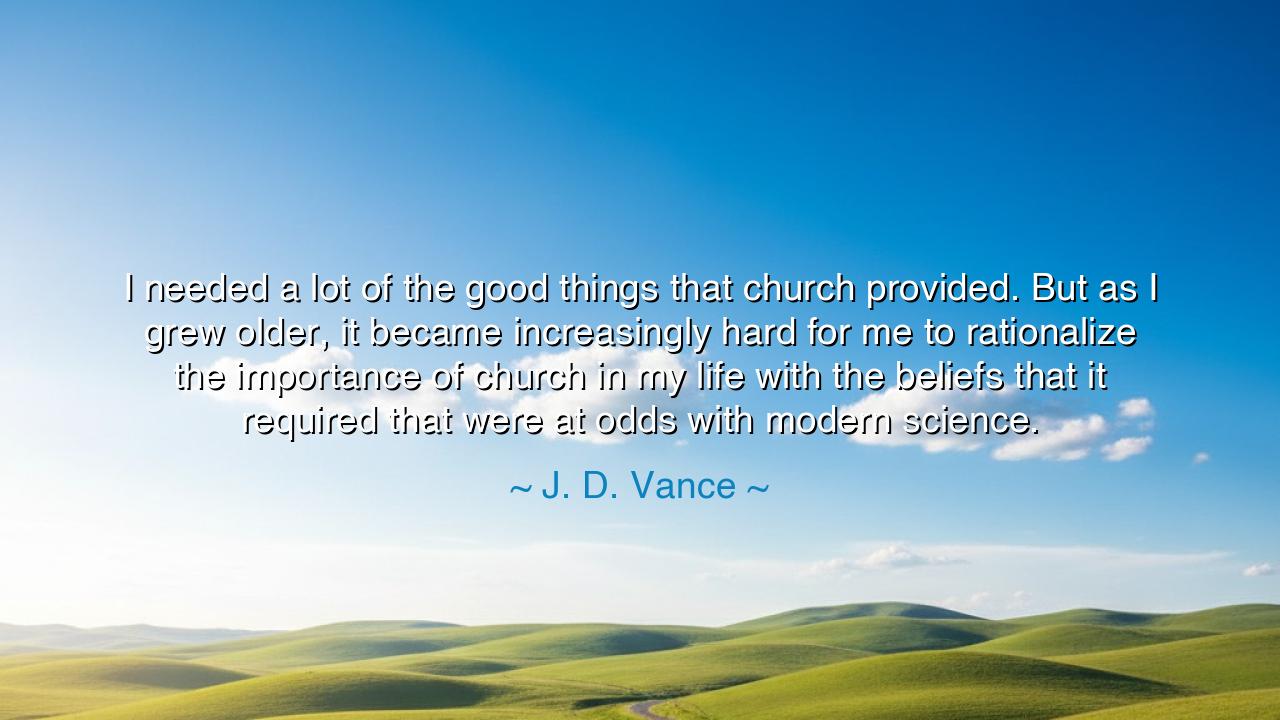
I needed a lot of the good things that church provided. But as I
I needed a lot of the good things that church provided. But as I grew older, it became increasingly hard for me to rationalize the importance of church in my life with the beliefs that it required that were at odds with modern science.






Hear, O Seekers of Truth, the words of J. D. Vance, a soul who, as he journeyed through life, found himself torn between the sacred traditions of faith and the advancing wisdom of science. "I needed a lot of the good things that church provided. But as I grew older, it became increasingly hard for me to rationalize the importance of church in my life with the beliefs that it required that were at odds with modern science." In these words, Vance speaks of the deep conflict that arises when the spiritual world and the rational world—the world of faith and the world of knowledge—seem to diverge. It is the struggle of many a soul, for both faith and science offer a vision of the world, yet sometimes these visions are at odds. The question becomes: how does one reconcile the deep comfort and community of religious faith with the unyielding truths of modern science?
Consider, O Seekers, that in the days of the ancient philosophers, the pursuit of wisdom was often a journey between the worlds of spirit and reason. Plato, in his dialogues, sought to find the balance between the unseen world of ideal forms and the seen world of the physical senses. He recognized that the soul and the body were not easily reconciled, yet he still believed in the higher truth of the world beyond. In the same way, Aristotle believed that knowledge could be found through observation, yet he did not deny the role of reason in understanding the spiritual aspects of human existence. And so, through the ages, great thinkers have wrestled with how to balance the unseen forces of faith with the observable laws of nature.
As we move into the modern world, we see Vance's struggle as emblematic of the tension felt by many in our time. The church, for all the good things it provides—the sense of community, the comfort in times of hardship, the moral guidance it offers—often demands a belief in things that seem to defy the reason of modern science. The belief in miracles, the creation of the world in seven days, the notion of an immortal soul—these ideas, for many, clash with the scientific understanding of the universe. As science peels back the layers of mystery, revealing the complex laws of nature, the age of the earth, and the evolution of species, those very truths seem to contradict the doctrines of faith that many have held for centuries.
This internal struggle is not new. We need only turn to the life of Galileo Galilei, whose great discoveries in astronomy challenged the beliefs held by the Church. When Galileo proposed that the Earth revolved around the Sun, a belief held by science but denied by the Church, he was met with fierce resistance. The truths of science that Galileo uncovered were at odds with the Church’s teachings about the center of the universe, and his courage to follow his reason cost him dearly. Yet, in time, the truth of Galileo’s findings prevailed, and the Church, too, came to recognize that faith and science need not be in opposition. Galileo's struggle serves as a poignant reminder that the pursuit of knowledge—whether through faith or science—is a noble endeavor, but it requires courage to question and integrity to seek the truth, even when it conflicts with the ideas that have long been held.
And so, O Seekers, Vance’s words call us to reflect upon the tension that many feel today. The world of faith, with all its warmth and comfort, can sometimes feel at odds with the world of science, with its demand for evidence and reason. But let us remember that truth, whether discovered through the lens of faith or the lens of science, is still truth. The challenge lies not in choosing between them, but in finding harmony. For just as the ancient philosophers sought to unite the soul and body, so too must we seek to unite the spiritual and the scientific. Faith and reason need not be enemies; rather, they can be companions on the same journey of understanding.
The lesson, O Seekers, is clear: do not fear the struggle between faith and science, for it is a struggle that has been faced by great minds throughout history. Seek the truth, not just in the physical world, but in the realms of the heart and soul as well. Just as Galileo and others challenged the established beliefs of their time, so too must we question, reflect, and explore. Let faith be a guide for the heart, and let science be a guide for the mind. Both are valuable tools for the seeker, and both can lead us to a greater understanding of ourselves and the world in which we live.
So go forth, O Seekers, with the understanding that faith and science are not opposing forces, but two sides of the same coin. Honor both, and seek to find the harmony that lies between them. Let the search for truth be a journey of both heart and mind, and may you be courageous in following the path that brings you closer to the deepest mysteries of existence. Know that the answers to life's great questions may not always come in one form, but that in the union of the spiritual and the rational, the heart and the mind, you will find the wisdom to guide you on your way.






AAdministratorAdministrator
Welcome, honored guests. Please leave a comment, we will respond soon